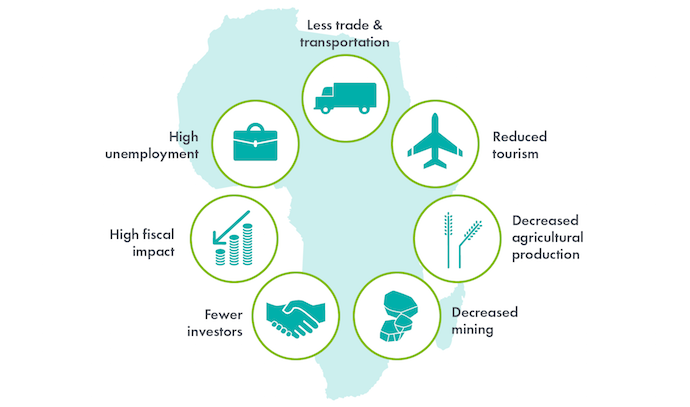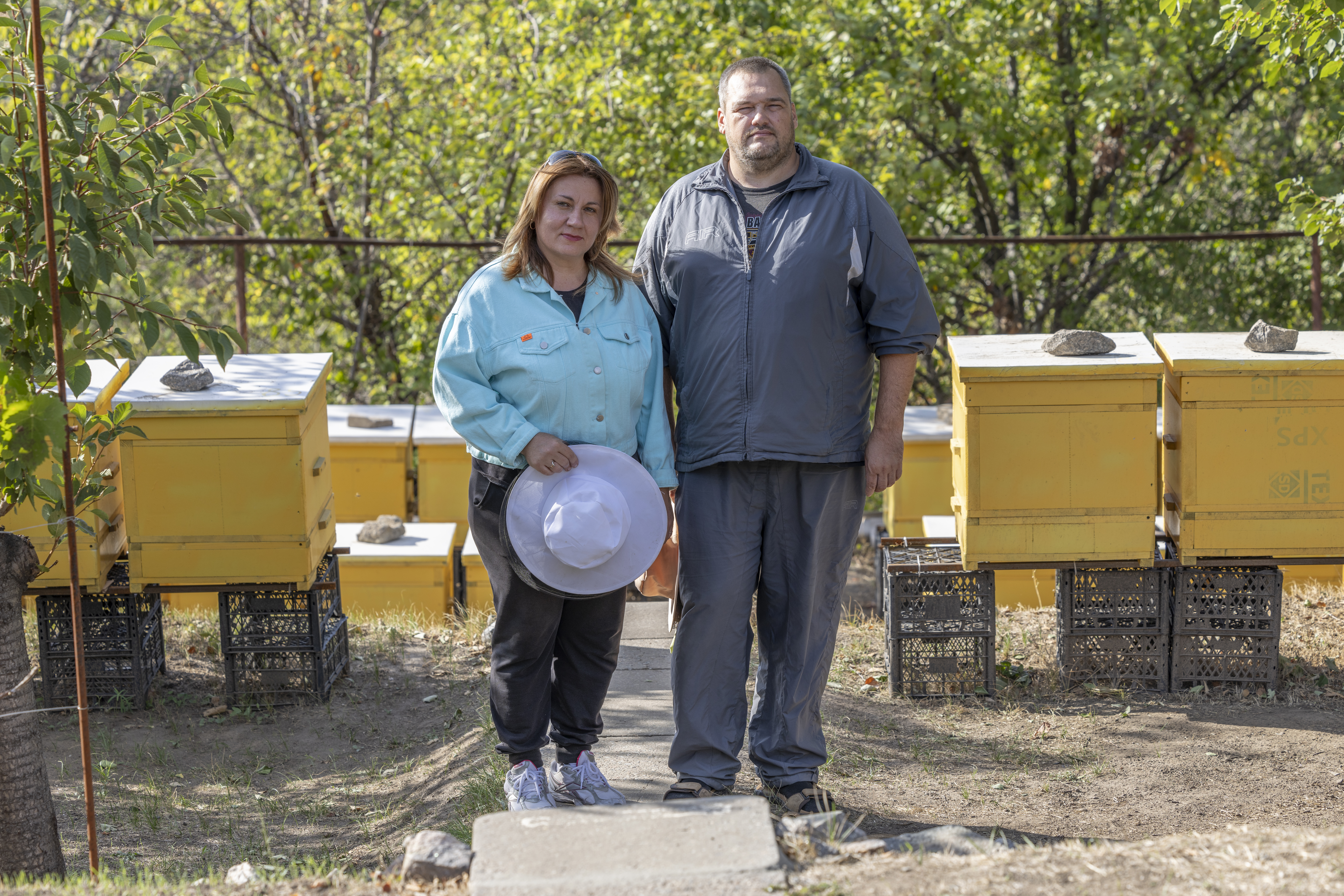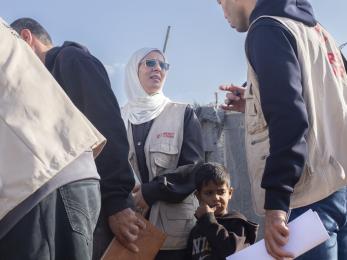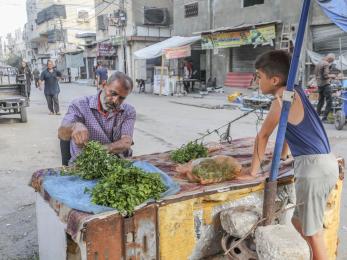Chapter 4: How does Ebola affect the economy?

In addition to the loss of human life, the economic effects of an Ebola outbreak are devastating. An Ebola outbreak impacts all sectors of the economy, and can have long-lasting effects. In this chapter, we'll look closely at Ebola's impact on the economy with the goal to inspire solutions.
What impact has Ebola had on parts of Africa?

When Ebola breaks out in a country, it becomes a priority to contain the virus and prevent it from spreading across borders or between individuals. It is necessary to take preventive measures to keep a widespread outbreak from happening. However, the steps needed to control and contain Ebola takes a toll on the economy. As a result of the Ebola epidemic in 2014, household incomes went down and poverty grew in the countries hit hardest by the virus. According to the World Bank's updated 2016 report, the overall impact of the Ebola epidemic on Liberia, Guinea and Sierra Leone was estimated at $2.8 billion.
Ebola impacts the economy in several different ways.
1. Less trade and transportation
An Ebola outbreak may lead to restrictions on trade and transportation to prevent transmission of the virus. This may mean the limit of goods moved within a country. It also means limiting the movement of people and goods between countries. For example, in 2014, Sierra Leone declared a lockdown for three days to decrease the movement of people and to give healthcare workers a chance to identify new cases and spread awareness about the disease. The country also placed quarantine restrictions on high-risk areas and set curfews, which lasted as long as several months in some areas. Situations like this can harm an economy that relies heavily on cross-border trade. According to the Africa Economic Brief, informal cross-border trade is a source of income for about 43 percent of Africa's population.
2. Reduced tourism
News of an Ebola outbreak prevents tourists from traveling to countries where an outbreak exists. Many countries rely on tourism economically. For example, according to the World Bank, receipts from 2012 added up to over $36 billion and contributed 2.8 percent to the gross domestic product (GDP) in the sub-Saharan Africa region.
When the Ebola epidemic hit West Africa, borders closed and airlines stopped. According to the World Travel and Tourism Council, tourist arrivals went down by half from 2013 to 2014. In addition, tourists saw the entire continent of Africa as a risk, even though the Ebola outbreak was not all over Africa. For example, countries such as Kenya, which is located thousands of miles from the West Africa Ebola zone, saw a drastic decrease in tourism due to fear of Ebola. According to the CDC, most travelers are at very low risk of getting Ebola. Despite this, tourism declines during outbreaks.
3. Decreased agricultural production
The epidemic had an adverse effect on agricultural market chains in the three West African countries, particularly on communities that rely on agriculture as a main source of income. The Ebola epidemic mostly impacted the transporting of agricultural goods to consumption areas. Workers were afraid of traveling to contaminated areas, and the number of traders decreased by 20 percent at the height of the epidemic. This lowered farmers' incomes and led to unstable crop prices.
Local rice production, for example, was affected due to difficulty maintaining farmer groups, but the decrease in production was contained at the national level. Farmers were encouraged to continue farmer group activity and take measures to reduce infection risk for workers. Overall, an Ebola outbreak disrupts agricultural production, and may lead to fewer crops and higher food prices.
4. Decreased mining activity
An Ebola outbreak leads to decreased mining activity due to travel restrictions and loss of workers. For example, the epidemic decreased mining for gold and diamonds in Liberia due to mobility restrictions. The prices of bauxite, iron ore and gold declined by 30 to 60 percent compared to previous years in the three West African countries hit by the virus.
Also, according to The Wall Street Journal, the Ebola epidemic delayed mining projects meant to be filled by thousands of workers in Guinea, Liberia and Sierra Leone. One example is the mining company Rio Tinto, which stopped work on a $20 billion iron ore mine in an area affected by the virus. The virus sent many skilled workers away in fear of getting infected, and projects came to a halt.
5. Fewer investors
Investors lose confidence in companies located in Ebola-afflicted areas. For example, in Liberia, ArcelorMittal, a large mining company, put a hold on investments to expand mining production of iron ore during the epidemic. A second large company, China Union, closed its operation in response to the epidemic.

6. High fiscal impact
When Ebola strikes, economic activity goes down. Declining economic activity reduces revenue from taxes and tariffs. In 2015, the deficits were estimated at 8.5 percent of GDP in Liberia, 4.8 percent in Sierra Leone and 9.4 percent in Guinea. However, financial assistance reduced some of the shock.
7. Higher unemployment
In 2016, the World Bank reported there was a 40 percent decrease in those working in Liberia since the epidemic began. As a result of the 2014 Ebola epidemic, the private sector in Sierra Leone lost half its workers.
With companies shutting their doors and households afraid to go to work or send their children to school, it's easy to see how an Ebola outbreak grinds productivity to a halt.
How much did the Ebola outbreak cost?
Guinea, Liberia and Sierra Leone lost $2.2 billion in GDP in 2015 as a result of the epidemic. The greatest losses occurred in private sector growth, agricultural production and trade. A more recent study published in The Journal of Infectious Diseases estimates the total economic and societal costs of the epidemic to be $53 billion. This study considered the cost of losing human life, long-term conditions for Ebola survivors, treatment costs, infection control and deaths caused by other diseases during the epidemic.
How much did the U.S. spend on Ebola?
The United States donated approximately $2.3 billion to fight the Ebola epidemic and fund response activities. Other countries such as Germany and the United Kingdom also donated millions to the international Ebola response. By the end of 2015, more than $3 billion was spent to fight the epidemic.
Within the United States, it cost hospitals around $25,000 to $50,000 a day to care for patients with Ebola. According to the CDC, 11 people were treated for Ebola in the United States from 2014 to 2016.
Despite the costs, there are ways to help rebuild and strengthen communities.
What is Mercy Corps doing to help with economic recovery?
In DRC during the current outbreak, we're going beyond hygiene education and clean water access to build stronger futures for people — even after Ebola is gone. Here's the other work we're doing in DRC:
- Providing life-saving emergency assistance, include cash aid, to the most vulnerable families suffering in the current crisis.
- Offering financial education and small loans to women and young people to foster economic opportunity.
- Helping farmers grow more food and increase their incomes through education, training and crop diversification.
- During the previous outbreak, we provided emergency cash transfers and gave agricultural grants to farmers.


